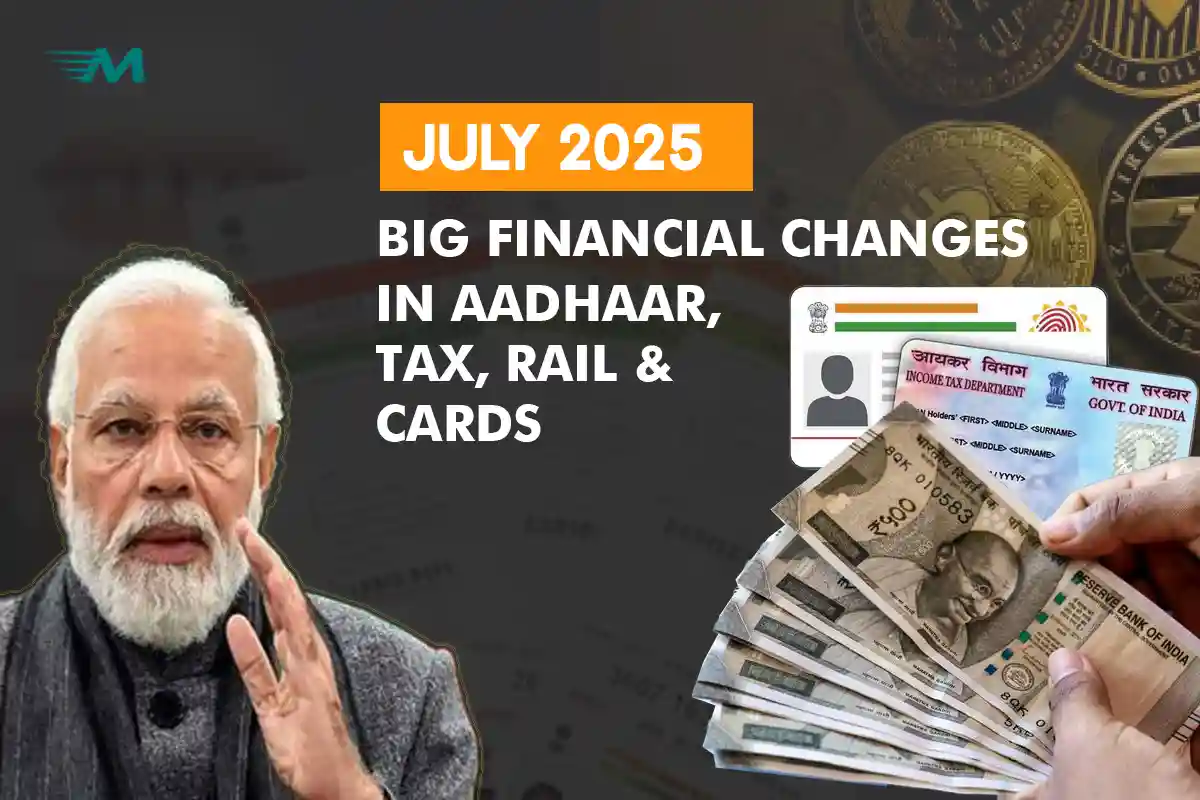July 2025: Big Financial Changes in Aadhaar, Tax, Rail & Cards
As July 2025 kicks off the second quarter of the financial year, a wave of big financial changes is set to reshape personal finance across India. From stricter Aadhaar requirements for PAN cards to updated railway ticketing rules, GST compliance changes, and revised banking policies, these updates will influence how individuals manage their money. Here’s a detailed look at the key reforms coming into effect—each designed to enhance transparency, streamline processes, and curb misuse.
Aadhaar-PAN Linkage Tightened Amid Big Financial Changes
Effective July 1, 2025, the Central Board of Direct Taxes (CBDT) has mandated Aadhaar authentication for all new Permanent Account Number (PAN) applications. This shift is part of the big financial changes introduced this month, replacing the earlier flexibility of using any valid ID or birth certificate. The update aims to bolster tax compliance and reduce fraudulent PAN creation.
The move also aligns with the government’s push for digital integration, ensuring seamless tracking of financial transactions and promoting a more transparent financial system.
For individuals who enrolled for Aadhaar on or before October 1, 2024, using an enrolment ID, the deadline to link their PAN with Aadhaar is December 31, 2025. Failure to comply will render the PAN inoperative, halting activities like tax filings or bank transactions.
The Income Tax Department has also emphasized that holding multiple PANs is illegal, with a potential penalty of ₹10,000. This change aims to enhance security and eliminate duplicate PANs, fostering a more robust tax system.
Indian Railways Overhauls Tatkal Rules
Starting July 1, 2025, Indian Railways is implementing stricter measures for Tatkal ticket bookings to ensure equitable access. Aadhaar authentication will be mandatory for booking Tatkal tickets through the IRCTC website or app. From July 15, 2025, online Tatkal bookings will also require Aadhaar-based OTP verification, adding an extra layer of security.
For bookings at computerized Passenger Reservation System (PRS) counters or via authorized agents, OTP authentication linked to the registered phone number will be required starting July 15, though Aadhaar verification won’t be necessary in these cases.
To prevent bulk bookings, authorized agents will be barred from booking Tatkal tickets during the first 30 minutes of the booking window—10:00 am to 10:30 am for AC classes and 11:00 am to 11:30 am for non-AC classes. These reforms aim to prioritize genuine passengers and curb ticket hoarding by agents.
Proposed Marginal Train Fare Increase
The Ministry of Railways is considering a modest fare hike effective July 1, 2025, marking the first revision since January 2020. The proposed increase includes 1 paisa per kilometer for non-AC classes in Mail/Express trains and 2 paise per kilometer for AC classes.
If approved, this hike could generate an additional ₹700 crore for the 2025-26 financial year, with an estimated ₹920 crore for the full fiscal year 2026. Described as the smallest fare adjustment in over a decade, this change aims to balance operational costs while minimizing the burden on passengers.
GST Filing Rules Strengthened
The Goods and Services Tax Network (GSTN) has introduced significant updates to GST compliance starting July 2025. The GSTR-3B form, used for monthly GST payments, will become non-editable, with tax liabilities automatically populated from GSTR-1, GSTR-1A, or IFF filings. This change aims to reduce discrepancies and ensure accurate reporting, requiring taxpayers to verify data before submission.
Additionally, from the July tax period, GST returns—including GSTR-1, GSTR-3B, GSTR-4, GSTR-5, GSTR-5A, GSTR-6, GSTR-7, GSTR-8, and GSTR-9—cannot be filed after three years from the original due date. GSTN advises taxpayers to reconcile records and file pending returns promptly to avoid penalties and ensure compliance.
Banking Sector Updates
HDFC Bank is rolling out revised credit card policies effective July 1, 2025. A 1% fee will apply to transactions exceeding specific limits: ₹10,000 for wallet loading, ₹50,000 for utility payments, and ₹10,000 for online gaming, with a monthly cap of ₹4,999.
Rent payments, fuel transactions above ₹15,000, and education payments via third-party apps will also incur a 1% fee. Reward point rules are being updated, with no points awarded for online skill-based gaming and new monthly caps on insurance-related points. These changes encourage prudent spending to avoid additional charges.
Extended ITR Filing Deadline
The CBDT has extended the Income Tax Return (ITR) filing deadline for the financial year 2024-25 (assessment year 2025-26) to September 15, 2025, moving away from the traditional July 31 cutoff. This extension accommodates updates to ITR forms, providing taxpayers with additional time to ensure accurate and compliant filings.
Navigating the Big Financial Changes
These Big Financial Changes reflect India’s strong push toward digitalization, transparency, and efficiency in both financial and public systems. To stay ahead, individuals should proactively link their PAN with Aadhaar, authenticate their IRCTC accounts, review GST filings, and monitor credit card transactions. By preparing in advance, households can ensure smooth compliance and avoid disruptions as the financial landscape transforms in July 2025.

